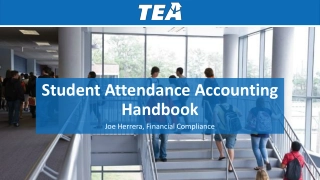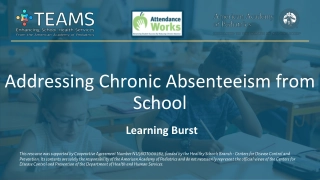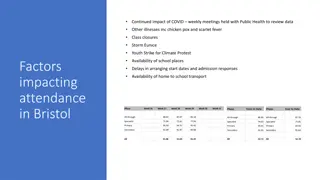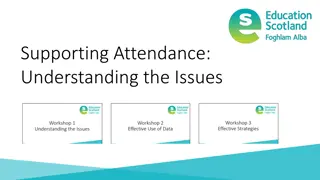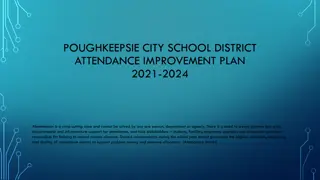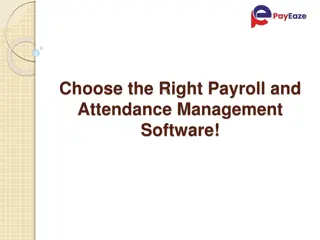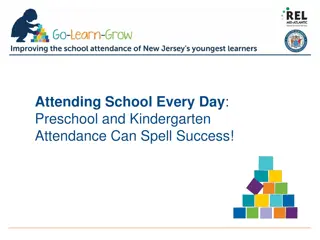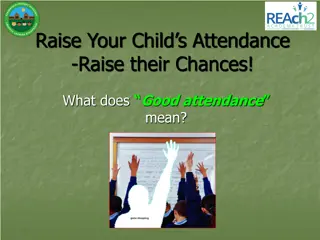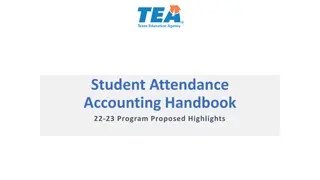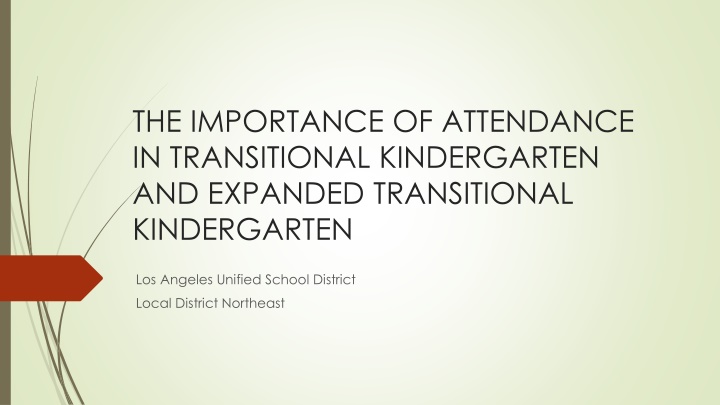
Importance of Attendance in Transitional Kindergarten and Expanded Transitional Kindergarten
Understanding the impact of student attendance in the early years is crucial for academic success and social development. Chronic absence can lead to long-term negative outcomes, affecting a child's ability to read proficiently by 3rd grade. Learn about the significance of attendance patterns in Transitional Kindergarten and how they shape children's future behaviors and achievements.
Download Presentation

Please find below an Image/Link to download the presentation.
The content on the website is provided AS IS for your information and personal use only. It may not be sold, licensed, or shared on other websites without obtaining consent from the author. If you encounter any issues during the download, it is possible that the publisher has removed the file from their server.
You are allowed to download the files provided on this website for personal or commercial use, subject to the condition that they are used lawfully. All files are the property of their respective owners.
The content on the website is provided AS IS for your information and personal use only. It may not be sold, licensed, or shared on other websites without obtaining consent from the author.
E N D
Presentation Transcript
THE IMPORTANCE OF ATTENDANCE IN TRANSITIONAL KINDERGARTEN AND EXPANDED TRANSITIONAL KINDERGARTEN Los Angeles Unified School District Local District Northeast
WHAT IS THE IMPORTANCE OF STUDENT ATTENDANCE? The Los Angeles Unified School District (LAUSD) believes that student attendance and student achievement are closely intertwined. Students who develop patterns of good attendance are much more likely to be successful both academically and socially. Students in TK/ETK are establishing patterns of behavior that may impact their futures as K-12 students and beyond.
IMPORTANCE OF SCHOOL ATTENDANCE IN EARLY YEARS 1. Socio-Emotional Growth Develop relationships with new children and adults Learn positive social interactions Develop skills to resolve conflicts Nurture independence 2. Learn Positive Educational Habits Stay focused, on-task Solve problems Adapt to school-home transition 3. Increase Learning Opportunities Positive classroom behaviors like sharing and turn taking Exposure to classroom structure and routines Kindergarten : Illustration Featuring Kids Piled One on Top of the Other and Hiding Behind a Toga
RISKS ASSOCIATED WITH CHRONIC ABSENCE What is Chronic Absence? A student is defined as Chronically Absent if the student s attendance rate is 90 % or less This breaks down to 18 or more absences at the end of a 180-day school year; just 1-2 absences per month. 83% of students who are chronically absent in Kindergarten and 1stgrade will not read proficiently in 3rdgrade and will therefore be 4 times more likely to drop out of high school. - U.S. Senator, Former Attorney General of California Kamala Harris, 2015 Children regardless of gender, socioeconomic status or ethnicity, lose out when they are chronically absent. -National Center for Children in Poverty, 2008
STUDENTS CHRONICALLY ABSENT IN KINDERGARTEN AND 1ST GRADE ARE MUCH LESS LIKELY TO READ PROFICIENTLY IN 3RD GRADE Percent Students Scoring Proficient or Advanced on 3rdGrade ELA Based on Attendance in Kindergarten and in 1stGrade 100% 80% 64% 60% 43% 41% 40% 17% 20% 0% No attendance risks Small attendance risks Moderate attendance risks High attendance risks No risk Small risk Moderate risk Missed less than 5% of school in K & 1st Missed 5-9% of days in both K & 1st Missed 5-9% of days in 1 year &10 % in 1 year High risk Missed 10% or more in K & 1st Source: Attendance Works Source: Applied Survey Research & Attendance Works (April 2011)
STARTING IN PRE-K, MORE YEARS OF CHRONIC ABSENCE = NEED FOR INTENSIVE READING SUPPORT BY 2ND GRADE Some risk At risk * Indicates that scores are significantly different from scores of students who are never chronically absent, at p<.05 level; **p<.01; ***p<.001 Source: Attendance Works
CHRONIC EARLY ABSENCE CONNECTED TO READING LEVEL IN 3RD GRADE Chronic absence in kindergarten Lower levels of literacy in first grade Lower achievement as far out as fifth grade A Rhode Island Data Hub analysis found that compared to kindergartners who attend regularly, those chronically absent: Scored 20% lower in reading and math in later grades and gap grows 2x as likely to be retained in grade. 2x likely to be suspended by the end of 7th grade. Likely to continue being chronically absent Source: Attendance Works
SEPARATION DISTRESS It is common, and often normal, for young children to put some mild resistance, and even cry, upon separating from parents/guardians when they first begin to attend school. Teachers and school support staff can help parents with tips and guidance to ease your child s period of adjustment. In less common instances, some children may demonstrate intense anxiety, or their resistance persists over a greater period of time. If so, there may an underlying problem. Concerned parents should consult with their child s teacher, and/or pediatrician. A referral to counseling may be indicated. kidshealth.org, 2017 Tips and Recommendations to ease separation difficulty for many children starting TK/ETK: Stay calm when your child becomes anxious about a situation or event Try to maintain a regular daily routine Plan for transitions (For example, allow extra time in the morning) Say a firm goodbye and reassure the child that you will be back Find times to allow your child to practice being independent Develop a quick goodbye routine Maintain an on-time pick up routine to build your child s confidence Be consistent: reassure your child that school is a safe place Source: Anxiety and Depression Association of America, 2010-2018 Source: Helpguide.org, 2018
EXCUSED ABSENCES WITH VERIFICATION Illness or injury Medical appointment Medical o Dental o Optometric o Chiropractic o Court Appearance for student Funeral Administrator Approval * Please refer to Parent Student Handbook for further information.
WHAT CAN PARENTS DO? Attend parent-teacher conferences and monitor your child s progress regularly on parent portal Plan family vacations for non- school days only Schedule non-emergency medical and dental appointments after school hours or weekends or during your child s vacation Talk regularly to your child about the value of education and its importance to their future. Make sure your child gets at least 10 hours of sleep and a nutritious breakfast each day Create morning and evening routines Develop a back up plan by building relationships with other families for when emergencies arise (i.e. drop off or pick up support) Make sure to update your contact information as needed Need Support? Reach out to the School s PSA Counselor or other members of School Staff for help in accessing school and community resources to help!

